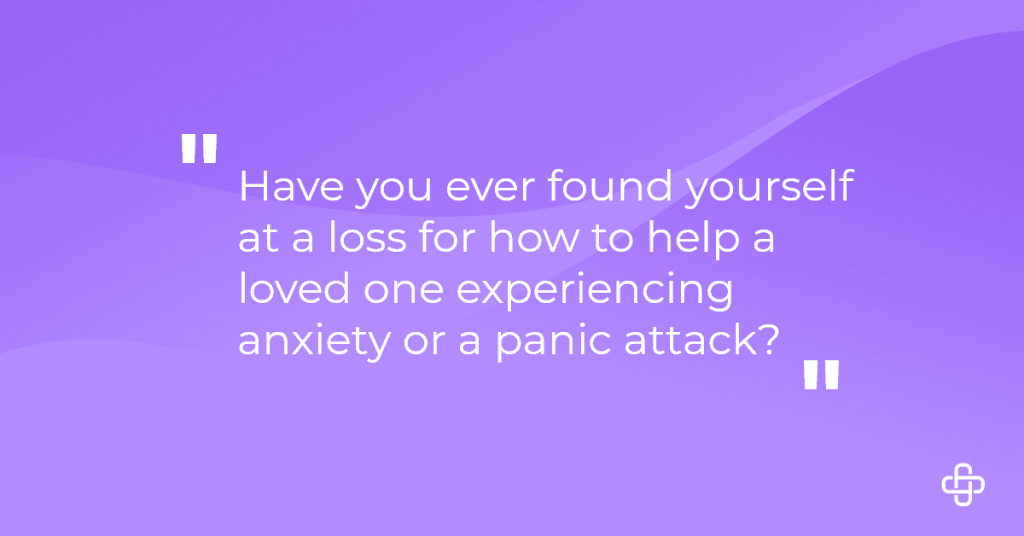Have you ever found yourself at a loss for how to help a loved one experiencing anxiety or a panic attack?
It can be a deeply challenging and distressing situation for the person suffering and those caring about them. Understanding what to do and say in these moments is crucial to providing effective support.
Anxiety and panic attacks are more common than you might think. Someone close to you may be struggling with these issues, whether a friend, family member, coworker, or employee.

Understanding Anxiety and Panic Attacks
Definition and Common Symptoms
Anxiety is a feeling of worry, nervousness, or unease about something with an uncertain outcome. It can range from mild uneasiness to severe panic attacks. Common symptoms include rapid heartbeat, sweating, trembling, shortness of breath, and a sense of impending doom.
Panic attacks are sudden episodes of intense fear that trigger severe physical reactions when there is no real danger or apparent cause.
How They Can Affect Daily Life and Work
Anxiety and panic attacks can drastically affect a person’s daily life. They may avoid certain situations or places for fear of triggering an attack.
This can lead to absenteeism, decreased productivity, and difficulty concentrating at work. Social interactions can also become challenging, making it hard for the individual to maintain relationships and social obligations.
Symptoms of Anxiety and Panic Attacks
Understanding the symptoms of anxiety and panic attacks is crucial for providing effective support. Here is a bulleted list outlining what individuals with anxiety and panic attacks may experience:
Physical Symptoms:
- Rapid heartbeat or palpitations
- Sweating profusely
- Trembling or shaking
- Shortness of breath or hyperventilation
- Chest pain or discomfort
- Dizziness or lightheadedness
- Nausea or abdominal distress
- Chills or hot flashes
- Numbness or tingling sensations
Psychological Symptoms:
- Overwhelming sense of impending doom or danger
- Fear of losing control or going crazy
- Feeling detached from reality or oneself (depersonalization or derealization)
- Intense worry or irrational fears
- Persistent thoughts about the cause of anxiety
Behavioral Symptoms:
- Avoidance of situations that might trigger the anxiety or panic attack
- Skipping social gatherings and public places
- Difficulty in initiating and maintaining conversations and relationships
- Reluctance to leave safe spaces, such as home, due to fear of public episodes
Understanding these symptoms and their impact can help you empathize and proactively offer the right kind of support.
Supporting Someone with Anxiety or Panic Attacks
Empathy and Understanding
The first step in supporting someone with anxiety or panic attacks is to show empathy and understanding. Recognize that their feelings are valid, and that anxiety is not something they can simply ‘snap out of.’ Listen to them without judgment and offer your support.
Practical Ways to Offer Support
There are several practical ways to support someone dealing with anxiety. Encourage them to seek professional help and offer to accompany them to appointments if they feel uncomfortable going alone. Simple gestures like checking in regularly and being a calming presence can also make a big difference.
Tips for Employers and Coworkers
Creating a Supportive Work Environment
Employers and coworkers play a crucial role in supporting employees with anxiety. Creating a supportive work environment can help reduce stress and anxiety levels.
This includes fostering open communication and promoting a culture of understanding and empathy.
Flexible Work Arrangements and Accommodations
Offering flexible work arrangements can significantly ease the burden on employees dealing with anxiety.
This might include options for remote work, flexible hours, or providing a quiet space where they can take breaks if needed. Accommodations like these can help employees manage their anxiety while remaining productive.
Advice for Friends and Family
How to Approach Someone Who Is Struggling
Approaching someone who is struggling with anxiety requires sensitivity and care. Start by expressing your concern and willingness to support them.
Avoid making judgments or offering unsolicited advice. Instead, listen actively and ask how you can help.
Support Without Judgment
It’s essential to support loved ones without judgment. Understand that anxiety is a real and challenging condition.
Offer your support and encouragement and be patient as they work through their struggles. Remember, your non-judgmental support can be incredibly empowering.
Professional Help and Resources
Encouraging Professional Consultation
Encouraging your loved one to seek professional help is crucial. Therapists, counselors, and doctors can provide valuable tools and strategies for managing anxiety.
Offer to help them find a qualified professional and reassure them that seeking help is a sign of strength, not weakness.
Highlighting Available Resources and Support Groups
Many resources and support groups are available for those dealing with anxiety and panic attacks. These can offer additional support and a sense of community.
Share information about local support groups, online forums, and educational materials that can help them better understand and manage their condition.
Final Thoughts
Supporting someone with anxiety or panic attacks requires empathy, understanding, and practical assistance. You can make a significant difference in their lives by creating a supportive environment and encouraging professional help.
The most important thing you can do is to be there for them without judgment. If you find this post helpful, consider sharing it with others who might benefit from these insights.
Together, we can create a more understanding and supportive world for those dealing with anxiety.
To delve deeper into practical techniques for managing anxiety, watch Axiom Medical’s webinar replay, “Stress to Strengthened: Techniques for Managing Workplace Anxiety.” This valuable resource offers expert insights and actionable steps to transform stress into resilience.
Charli Pedersen is a published writer featured on Axiom Medical’s blog. She holds a bachelor’s degree in English, Professional and Technical Writing, and has experience creating content for businesses and non-profit organizations.










